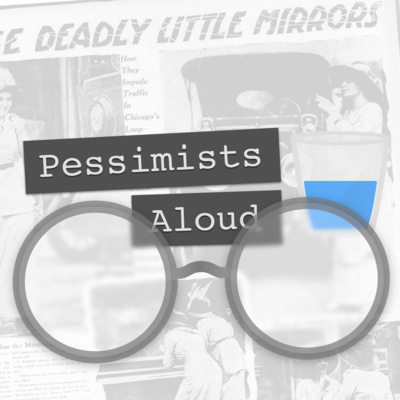
Pessimists Aloud
By Pessimists Aloud

Pessimists AloudJul 19, 2021

😷 'S.F. Feels Good Without Mask' - 1918, The San Francisco Examiner
In the 1918 Spanish Flu pandemic San Francisco quickly instituted a mask mandate, when it was repealed there was a countdown in the streets and jubilation as reported on the front page of The San Francisco Examiner. To the right of the report was a piece by Annie Laurie celebrating the moment and lamenting how smiles had been hidden away, she declared the pandemic over and a return of smiling - however not long after this mask rules were put back in place as a spike in flu cases occurred.
'S.F. Feels Good Without Mask - It Hides the Only Thing Worth While - This City Always Has a Smile' - The San Francisco Examiner, San Francisco, California, 22 Nov 1918, Fri • Page 9

📻 Weird, Ghostly and “Supernatural” Antics of the Radio (1931)
🎙 Backing Music: Louisiana by Duke Ellington and His Orchestra; Razaf; Schafer; Johnson - Brunswick (02650-B) Publication date 1938 Topics 78rpm, DanceDigitizing sponsor Kahle/Austin Foundation Contributor Internet Archive Language English - https://archive.org/details/78_louisiana_duke-ellington-and-his-orchestra-razaf-schafer-johnson_gbia0064586b/Louisiana+-+Duke+Ellington+and+His+Orchestra-restored.flac

✈️ “A Skeptical Nation Visits Upon the Airplane the Doubts it Once Felt for the Automobile" - The New York Times, 1928
At the end of the 1920s aeroplanes were becoming a more common sight in the skies, in 1928 The New York Times reported on growing public disdain, comparing it to past reactions to transport innovations like the automobile and bicycle. The piece was subtitled “A Skeptical Nation Visits Upon the Airplane the Doubts it Once Felt for the Automobile” explores many of the patterns we see today play out with electric scooters, bicycles and self-driving cars.
🗞 Source: https://timesmachine.nytimes.com/timesmachine/1928/12/23/95862830.pdf?pdf_redirect=true&ip=0

💉 'An Absurd Prejudice' - The New York Times, 1875
146 years ago The New York Times published an article lamenting anti-vaxxers, the piece began: "One might suppose that the popular prejudice against vaccination might have died out by this time, considering it has been practice for nearly a century." Today this statement is as amusing as it is painful, when considering anti-vaxxers remain a relevant movement. It rightly observed that “It seems useless to quote science, and a long and successful practice, against such dense stupidity as this. The ignoramus has a prejudice against the regular practitioner, and, with cruel kindness he kills his friend while trying to protect him against the art of a learned physician” going on to say “In spite of all our boasted progress curious revelations of popular ignorance and superstition are constantly showing us how little advance has been made." It finishes with a prediction “When knowledge is more evenly distributed there will be less of this fantastic and ignorant prejudice” - unfortunately, he was wrong.
Source: The New York Times, 1875 https://timesmachine.nytimes.com/timesmachine/1875/08/17/79089660.pdf?pdf_redirect=true&ip=0

📺 'The Lazy Half-Wit Comes Into His Own - A British Writer Reveals His Views on The Drawbacks of Mass Communication' (1953)
This screed against mass-media appeared in a 1953 issue of The New York Times, it was an excerpt from an article written by British novelist J.B. Priestly for The Newstatesman. Today people yearn for the days of unsocial mass-media, but we forget that once mass-media was a strange new cultural influence - Priestly gives some insight into concerns about it at the time.
Source: The New York Times, October 4th, 1953 https://timesmachine.nytimes.com/timesmachine/1953/10/04/92749299.html?pageNumber=346

✈️ 'The Flying Machines Which Do Not Fly' - The New York Times, October 9th, 1903
69 days before the Wright Brothers achieved manned flight The New York Times posited it could take between 1 and 10 million years to achieve. The piece chides those experimenting in the field and posits that human ingenuity will never achieve what evolution had done over millions of years. The piece ends implying it is a waste of time and money: "To the ordinary man, it would seem as if effort might be employed more profitably.”
'The Flying Machines Which Do Not Fly' - The New York Times, October 9th, 1903: https://timesmachine.nytimes.com/timesmachine/1903/10/09/102025405.pdf

📷 “Photographs are made to lie” (1897) + 🚲 “Bicycle Insanity” (1896)
These two pieces from the last decade of the 1900s cover two big consumer trends at the time: personal photographs and bicycle riding. Photographs of oneself were popular, as they are now and so was retouching! Photoshop used to mean a literal photography shop where edits were made to photos to enhance beauty, enlarge eyes and reduce bulge - the article lamented this trend for encouraging vanity. The bicycle was blamed by some doctors as causing insanity, often it was women that were the supposed victims and these notions were rooted in socially conservative resistance to women riding bikes.
📷 'Flatter the Sitters Vanity' - Emporia Daily Republican, Kansas 04 Aug 1897 - https://www.newspapers.com/clip/80037575/emporia-daily-republican/#
🚲 “Bicycle Insanity” - The Evening Telegram - Mar 20, 1896 https://news.google.com/newspapers?nid=35&dat=18960320&id=B6QmAAAAIBAJ&sjid=VjsDAAAAIBAJ&pg=3060,4534059&hl=en

🪞 'Those Deadly Little Mirrors' - Chicago Tribune, 1912
In 1912 hand mirror use evoked similar reactions to smartphones today, the Chicago Tribune reported: "WOMEN CONSTANTLY WALK INTO DANGER. Accidents which are due to women’s passion for looking in mirrors in stores are slight compared with ones which result from the use of the fascinating little hand mirror."
Source: Chicago Tribune 08 Sep 1912, Sun • Page 48 https://www.newspapers.com/clip/53610995/chicago-tribune/

♟️'Chess Playing Excitement' - Scientific American, 1859
♟️ The year is 1859, American Paul Morphy had just defeated Europe's top chess masters leading to a surge of interest among the American public. Scientific American tried to quell the hype, suggesting chess playing was a waste of time that would be better spent outside, the piece stated: "A game of chess does not add a single new fact to the mind; it does not excite a single beautiful thought; nor does it serve a single purpose for polishing and improving the nobler faculties"
🗞 Source: Scientific American, December 24th, 1859 - Page 9: https://books.google.ca/books?id=90hGAQAAIAAJ&dq=%22a+pernicious+excitement+to+learn+and+play%22&pg=PA9&redir_esc=y#v=onepage&q&f=false

📖 ‘Reading in Bed’ (1909) + ✈️ ‘Aeroplane Face’ (1908)
It was the first decade of the 1900s, the bicycle was now mainstream and manned flight was still a curious novelty, oh and reading in bed a dysfunctional sin.
Sources:
Aeroplane Face: http://digital.chipublib.org/digital/collection/examiner/id/12588/ • 🤳📰 View in AR: https://pessimistsar-flight.netlify.app
Reading in Bed: https://www.newspapers.com/clip/79793760/the-inter-ocean/

🎙 "Mr. Edison Has Invented Too Many Things" - The New York Times, 1878
'THE AEROPHONE' - The New York Times, March 25, 1878, Page 4 • 🤳🗞 VIEW IN AR: https://bit.ly/3uMHcGZ
In 1878 The New York Times wrote a scathing article on Thomas Edison and his little known invention the 'Aerophone' (a giant megaphone.) The piece began "Something ought to be done to Mr. Edison, and there is a growing conviction that it had better be done with a hemp rope" joking some wanted to him hanged, it went on to say "Mr. Edison has invented too many things" A year later Thomas Edison would perfect the incandescent lightbulb, his most famous and consequential breakthrough.